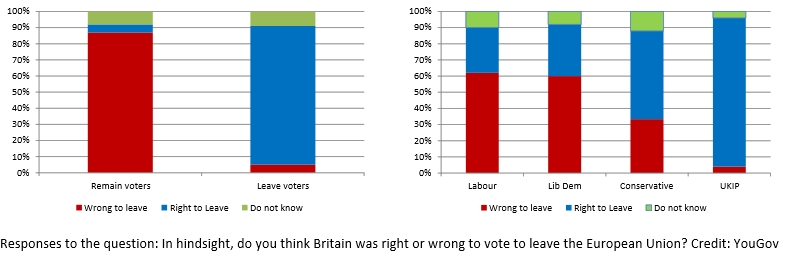In the week leading up to delivery of the Brexit divorce letter, public opinion in the UK appeared to be a strange mix of short-term pragmatism and long-term pessimism, writes John Egan.
On the day the letter confirming the intention of the United Kingdom to leave the European Union (EU), as specified by Article 50 of the Lisbon treaty, two well-regarded opinion polls explored the public mood.
Taken together, at first they seem paradoxical. But on a closer look they show opinion adhering to the Principle of Consistency as identified by Robert Cialdini.
Yesterday, the polling organisation YouGov brought together all it had learned about public attitudes towards Brexit. It found that little had changed since the Brexit referendum in June last year. If anything, more people accepted its inevitability and just want to get on with it. While preferring the “having cake and eat it” outcome that is Prime Minister Theresa May’s suggested deal, if there is a cliff then the UK should be prepared to go over it, the survey found. Of those interviewed most recently 55 per cent believed the threat to do so would enhance the chances of a good deal. This is a classic scenario in Brexit as a game of Chicken.
While 50 per cent more people would prioritise access to the free market over immigration controls, 64 per cent agree that a hard Brexit would “respect the results of the referendum”. However, the YouGov poll also shows that a greater percentage of Labour voters think it is wrong to leave the EU than those supporting the Liberal Democrats who are campaigning to remain in Europe. Perhaps it is not surprising then that 12 per cent of those polled remain uncertain of whether it was right or wrong to leave the EU.
Anthony Wells, director of political and social research at YouGov says: “public expectations are very high. People would like both the benefits of Brexit and the benefits of EU membership and a substantial proportion think this is both possible and are confident in Theresa May’s ability to deliver”.
“The problem for May is very soon those high expectations and ambitious targets will meet with the reality of the actual negotiations and the compromises that are almost inevitable.”
A greater percentage of Labour voters think it is wrong to leave the EU than those supporting the Liberal Democrats who are campaigning to remain in Europe
Meanwhile the Markit Household Finance Index published on Monday found that only 29 per cent of UK households see a positive long-term impact on the economy following the EU referendum compared to 53 per cent expecting a negative effect. It is an opinion that has steadily intensified since the Brexit referendum. In the Markit survey even those that originally saw benefits in Brexit have now turned pessimistic.
“Pessimism has now spread to all age groups and income brackets”, Chris Williamson, chief business economist at IHS Markit said.
“Shortly after the referendum, the older generations and the very poorest families were the exceptions in considering Brexit to be beneficial to the long-term health of the economy. However, even these pockets of the population have now become pessimistic.
“The most marked turnaround is evident among the poorest paid, who have switched from being the most optimistic to now being the most downbeat.”
It is likely that the UK public has given up on at least some of the more outrageous promises – now deemed aspirations – made during the Brexit campaign. The degree to which they have forgiven their purveyors has yet to be determined. This is one important ingredient in the psychology of consistency explored by David Rawlings in Chief-Exec.com.
According to this principle of consistency, consumers are found to continue to look for the positives in a product they have purchased long after faults have become apparent. There is a propensity to accommodate changes that challenge beliefs – up to a point.
Then the psychology of individuals can exhibit a switching behaviour which can be both rapid and “very vigorous, even violent”, Rawlings writes.
It is much too early to read such a specific psychological mechanism into the results of two opinion polls issued around such a tumultuous event. However, when the temperature cools, cooler minds will be scanning the signals for changing behaviour.
Follow on twitter: @johnmegan







